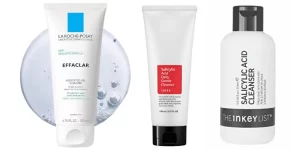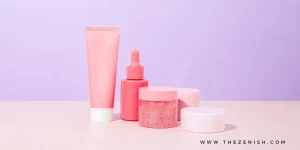
Are oil cleansers good for oily skin? Oil cleansers work by removing excess oil from your skin’s surface to prevent clogged pores and breakouts.
Oil is an effective cleansing agent because it can dissolve dirt, excess oil, sunscreen and impurities without stripping your skin’s natural oils.
Oil cleansers will only remove excess oils on the surface of your skin and leave the rest of your natural oils intact.
Most people with oily skin wrongly believe that using oil cleansers will make their skin more greasy. But this isn’t necessarily true.

Are oil cleansers good for oily skin?
Oil cleansing is a process by which you apply good oils to your skin to remove impurities trapped in the natural oils your skin produces. Once the oil is dissolved, your skin will appear radiant and soft.
The main benefit of oil cleansers is their ability to attract oil and debris sitting on your skin. So they’re an effective way to remove and dissolve stubborn makeup and sunscreen sitting on your face.
And unlike other cleansers that can be stripping and harsh, cleansing oils will help protect your skin’s natural pH and protective barrier and maintain ample hydration.
What oils should you use?
Not all oil cleansers are created equally, and any formula with highly comedogenic oils will probably clog your pores.
When choosing an oil cleanser, choose one with high-quality ingredients that are low on the comedogenic scale.
Non-comedogenic, light oils like jojoba, hazelnut, sweet almond, apricot kernel, and hemp oil are good options to start with when you have oily skin.
Just keep in mind that it might take some trial and error since everyone’s skin is different and will react differently.
Also if you have oily skin, cleansing oil alone doesn’t always work. You’ll need to cleanse your skin twice – first with the oil, then with a water-based cleanser.
If residue from the oil is left on your skin, it’ll be harder for your other skincare products to do their job which can lead to clogged pores.
Products to try
- DHC Deep Cleansing Oil
- The Face Shop Rice Water Bright Bundle
- Purito From Green Cleansing Oil
Is oil cleansing good for oily acne-prone skin?
Not if you’re dealing with a lot of persistent acne or inflammation.
Oil cleansing isn’t for everyone. It’s a good option if you have dry or sensitive skin. But it can make oily acne-prone skin worse.
So if that’s you and you want to try oil cleansing, you should use it sparingly and only in the evenings.
6 Common oil cleansing mistakes
1. Applying to wet skin
While most face washes need water to operate, it’s the opposite for cleansing oils.
The idea is to let the oil blend with the natural oils, dirt, and makeup on your face, and water and oil repel each other preventing a proper cleanse.
Instead, massage the oil in circular motions on a completely dry face then only add water to rinse.
2. Using oil from your kitchen
Never use vegetable, canola, shortening, or corn oil as oil cleansers. If you have to use oil from the kitchen, use cold-pressed, organic, extra virgin olive oil.
Organic, cold-pressed, and unrefined oils have more nutrients and antioxidants than other oils.
3. Not rinsing properly
Unlike facial oils, which serve as a final hydrating step after your moisturizer and are meant to stay on your skin all day, cleansing oils need to be completely removed.
If you don’t completely wash the oil off, it can cause breakouts and block the other products from absorbing properly, which means you miss out on the benefits of the rest of your routine.
4. Using coconut oil
Coconut oil’s popularity has made it the go-to product for kitchen and skin care, but while it can have antifungal and antibacterial properties, it can also be drying.
It’s also high on the comedogenic scale, which means that if you’re prone to breakouts, it can definitely clog your pores and lead to more problems.
Many people have issues with it, so if you suffer from breakouts or dry skin, stay on the safe side and keep it in the kitchen.
5. Not double cleansing
If you get breakouts after using cleansing oil, it’s likely because you’re not rinsing or wiping the oil off your face entirely.
So try double cleansing. Use the cleansing oil first, rinse then use another cleanser to completely remove it.
6. Thinking it will leave your face oily
That squeaky clean feeling that people love so much and associate with clean skin is actually a common mistake.
It’s not good to feel dry and tight after washing your face, and oil cleansing can help your skin feel more balanced.
Your skin’s moisture barrier provides a natural protection from bacteria, dryness, and irritation, and stripping it away can lead to breakouts and other skin issues.
Final thoughts
Don’t think that if you have oily skin you need to avoid using oil on your face. That’s not the case. In fact, products that strip your skin of its natural oils can make your skin oilier and it can become a vicious cycle.
Oil cleansing can help oily skin better remove excess sebum and other impurities from the pores.
It can also help to balance the natural oil production in the skin and remove makeup and sunscreen without causing irritation or adding any extra chemicals to your routine.



